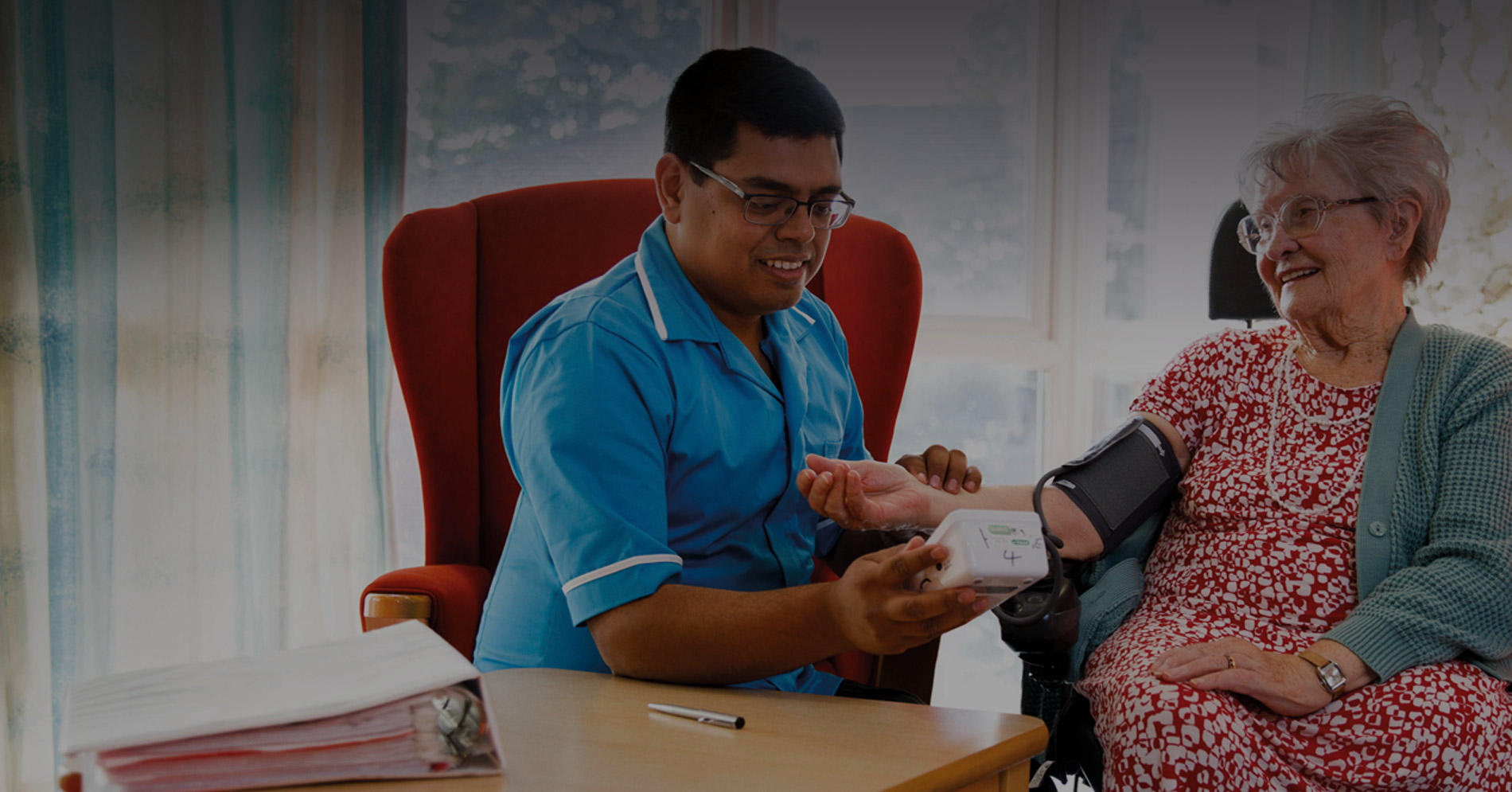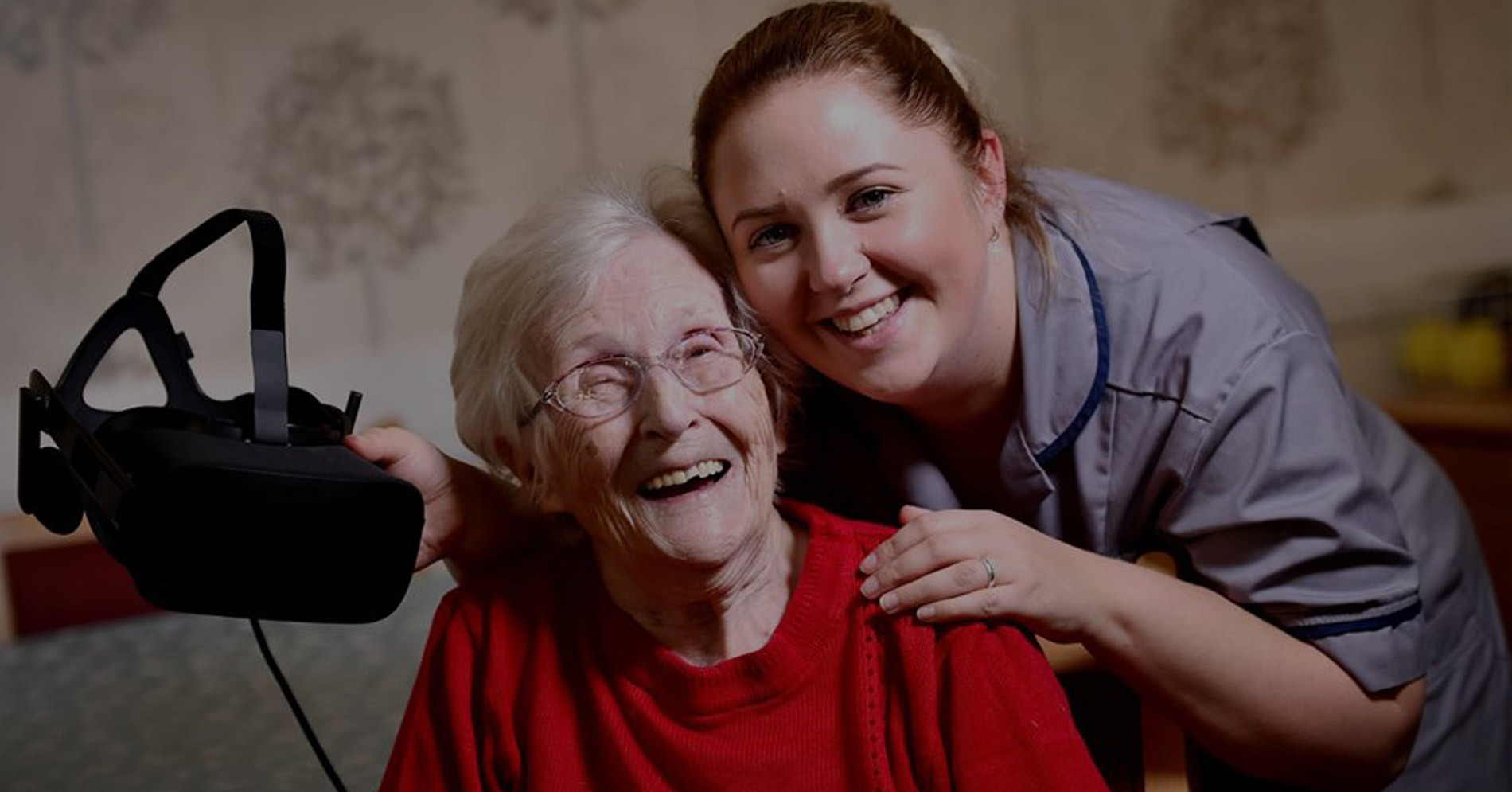14 October 2019
Acacia Training supports Every Day is Different recruitment campaign
Acacia Training is supporting the government’s Every Day is Different recruitment campaign, which encourages more people to pursue a care career.
The second phase of the campaign launched this month and will run until April 2020, and Acacia will be sharing information on social media using #everydayisdifferent #workincare.
Minister for Care, Caroline Dinenage, said: “The social care sector is crying out for talented care workers with the right values. We’ve seen from the campaign already that there are the right people out there but there is still a huge demand and we must reach out to more people to show them that careers in adult social care can be varied, rewarding and flexible.”
Victoria Sylvester, director at Acacia Training and registered nurse, said: “The care sector is a diverse sector with a huge amount of different roles and opportunities to develop and progress people’s careers. Everyone knows that investing in your staff produces a higher standard of skills and services to the sector, however, investing in staff education leads to higher staff retention – 440,000 (30.8%) of care workers left their post in the past 12 months, but 66% of leavers remained in the sector. By investing in training, employers can keep staff.”
A new report published this month by Skills for Care revealed 7.8% of the roles in adult social care are vacant, equal to approximately 122,000 vacancies at any time.
The report notes: “This rise in vacancies, in the context of a workforce that has grown at a slower rate in recent years, suggests that the sector is struggling to keep pace with demand as the population ages.”
Only around half (50%) of direct care-providing staff were found to hold a relevant adult social care qualification (49% held a Level 2 or higher qualification). Around four in five (83%) senior care workers held a relevant adult social care qualification at Level 2 or above.
Skills for Care said that by holding the correct qualifications, care workers benefit from:
- Quality service – completing qualifications leads to highly skilled and competent workers providing high quality care and support.
- Safety – training and qualifications in the key areas of health and safety provide reassurance about workers’ confidence and competence.
- Value for money – qualification achievements contribute considerable added value and assist in workforce planning for the organisation.
- Retention – workers who receive structured learning and development feel valued and supported and are more likely to remain in their posts.
Acacia Training is endorsed by Skills for Care, which means employers can trust that our education delivery is to a high standard and meets the specific needs of the care sector. Along with our 19-year history of delivering education in the sector and our Ofsted Good grade, we focus on excellent customer service and experience for our employers and learners.
To view our range of courses click here.
More news

National Apprenticeship Week 2023 – James’ Story Revisited
This National Apprenticeship Week, we are giving you an insight into some…

Professional Care Pathway – 4 – 6 Month Course Pathways (fully funded...
In 2022, a Skills for Care report found that staff vacancies across…

Multiply – Developing Better Numeracy Skills
With a new year on the horizon, many of us will be…
16 September 2019
Mental health first aiders – Acacia Training welcomes record numbers
Businesses are training thousands of mental health first aiders to help staff deal with depression, anxiety, stress and other conditions.
A report released by The Guardian this month revealed FTSE 100 companies have trained 10,000 staff, while mid-tier and small businesses are appointing first responders.
Acacia Training offers Mental Health First Aid England courses for adults and young people. MHFA England said 140,000 people were trained in 2018-19 – the most ever in a single year.
Victoria Sylvester, managing director of Acacia Training, said: “The progress being made with employers recognising the need for mental health first aiders in the workplace is a significant milestone in supporting employees and the wider wellbeing of their teams and individuals.
“It is fantastic to see and although there is still plenty more to be done, it is encouraging that this is now being recognised as being as important as physical first aid. Employers are also seeing the positive impact on staff sickness and retention when they support their people.”
All sorts of companies and sectors are training staff to become mental health first aiders and Lloyds Banking Group has a programme to train 2,500 by next year. Other companies to join the movement include Severn Trent, National Grid, EasyJet and Rolls-Royce.
The courses are most popular with the construction and finance sectors. In fact, coalition Building Mental Health (BMH) this month announced delivery of Mental Health First Aid (MHFA) England training to over 1,600 people in the construction sector.
This achievement comes at a time when the suicide rate for low-skilled manual construction workers is three times higher than the national average for male suicide.
The cost for businesses
According to MHFA England, currently, mental ill health costs employers up to £42 billion each year with over 300,000 people falling out of work due to poor mental health. More organisations are waking up to these facts and implementing measures to improve mental health in the workplace.
Simon Blake OBE, Chief Executive of Mental Health First Aid, (MHFA) England said: “Mental health training is a crucial pillar of any organisation’s wellbeing strategy and a key driver of continued organisational success.”
What does a mental health first aid course involve?
Mental health first aiders volunteer for the role and take a two-day training session, which provides them with all the information they need to identify signs associated with poor mental health, truly listen and signpost to other services.
This course includes a mix of presentations, discussions and group work activities. When you have completed the course, you will receive a certificate to confirm that you are a trained Mental Health First Aider.
More news

National Apprenticeship Week 2023 – James’ Story Revisited
This National Apprenticeship Week, we are giving you an insight into some…

Professional Care Pathway – 4 – 6 Month Course Pathways (fully funded...
In 2022, a Skills for Care report found that staff vacancies across…

Multiply – Developing Better Numeracy Skills
With a new year on the horizon, many of us will be…
11 June 2019
Children’s oral health among top issues in dentistry in 2019
If you have an interest in dentistry you won’t be surprised to find that children’s oral health is one of the hottest topics in the industry at the moment.
Latest government figures show 22.4% of children aged four to five are overweight or obese and accompanying that problem is child tooth decay – with tooth extractions still the most common reason for children’s hospital appointments.
Dentists must work to solve children’s oral health crisis
According to Dentistry.co.uk, a debate by Simplyhealth Professionals said it was up to dentists to come up with solutions to the children’s oral health crisis.
Head Dental Officer Catherine Rutland said: “People are starting to feel more comfortable going into schools etc, there’s a real climate of people starting to go into schools in their own time under their own local initiatives.
“People realise nothing is going to get done at a higher level, so we have to do it.”
Aside from children’s oral health, another hot topic was oral health for the elderly. The FGDP(UK) recently published guidelines on dealing with elderly patients through its Dementia-friendly dentistry guidelines and the CQC is going to provide a report shortly on elderly care.
You can find out more about becoming Dementia-friendly or about dementia courses here.
It was also revealed that aesthetic dentistry is on the rise, thanks to increased use of social media and selfies. The debate suggested that practices should consider this popularity and increase their offering to clients.
If you are passionate about dentistry and you want to boost your career, take a look at our Level 3 Diploma in Dental Nursing. The qualification is suitable for trainee dental nurses, dental receptionists and those who wish to work in the dental sector.
More news

National Apprenticeship Week 2023 – James’ Story Revisited
This National Apprenticeship Week, we are giving you an insight into some…

Professional Care Pathway – 4 – 6 Month Course Pathways (fully funded...
In 2022, a Skills for Care report found that staff vacancies across…

Multiply – Developing Better Numeracy Skills
With a new year on the horizon, many of us will be…
3 June 2019
Staffordshire company partners with a new programme to improve wellbeing
Staffordshire company Acacia Training has joined forces with the creators of a revolutionary new programme to improve mental health in the UK workforce.
The Trentham-based firm has become the official training partner for Wellonomics, a new online assessment tool devised to monitor and support wellbeing in the workplace. Acacia Training was the first in the UK to pilot the programme with its own employees, and has now teamed up with the platform’s developers, management consultancy Grasp The Nettle, to become the sole training provider of the programme as it is rolled out nationwide.
Wellonomics enables employers to carry out individual wellbeing assessments online. While individual responses are completely confidential and can only be viewed by the participant, the organisation’s overall results are aggregated to give employers a valuable insight into how their teams are feeling.
Victoria Sylvester, director at Acacia Training, comments: “The wellbeing of our team is extremely important to us, especially as we provide workplace mental health training to a wide range of organisations to help them support their own staff. I think Wellonomics is great because it is anonymous, so employees can be open and honest about how they’re feeling and each month we look at the up-to-date data at board level to discuss current issues.
“We’ve had a 100 per cent employee engagement rate and we’re already seeing clear benefits. For example, staff told us that they were checking emails late at night, so we’ve now put measures in place where we have a cut-off point for sending emails. We learned that some teams were feeling out of the loop on communications, so we set up a chat group to keep people informed. They’re only small changes but they’re making a big difference.”
The impact on its own workforce has been so positive, the company is now rolling it out to its learners to understand and improve their experience. For example, if feedback is that they
are short on time, it will ask tutors to prioritise this and provide helpful information on time management. It has also formed an alliance with Grasp the Nettle to roll Wellonomics out nationwide, with Acacia Training providing wellbeing modules and support linked to the software. This ensures the results are used to create positive change and helps line managers to develop the skills they need to improve the mental health of their teams.
Victoria added: “We’re really looking forward to working in partnership with Wellonomics to improve employee wellbeing. Mental health in the workplace is so important – a healthy, happy workforce helps employers to retain staff, reduce sickness and increase productivity.”
Co-Founder of Grasp the Nettle, Peter Yates-Round, said: “Many staff surveys, which often have low engagement rates and data which rapidly becomes outdated, are no longer fit for purpose. Wellonomics offers an antidote by providing a responsive, intuitive way to help leaders identify trends within their business. It gives employees an easy, confidential way to have their say and employers the tools they need to easily identify and implement change.
He added: “We are incredibly excited about our alliance with Acacia Training and our future plans to work together to lower staff attrition, increase productivity and create a happy and engaged UK workforce. Wellonomics is unique in that it protects employee confidentiality and provides leaders with up-to-the-minute feedback on how their teams are feeling. We were delighted to see how well it has been received at Acacia Training and now we’re looking forward to introducing it to business leaders in all sectors so that they – and their employees – can benefit.”
More news

National Apprenticeship Week 2023 – James’ Story Revisited
This National Apprenticeship Week, we are giving you an insight into some…

Professional Care Pathway – 4 – 6 Month Course Pathways (fully funded...
In 2022, a Skills for Care report found that staff vacancies across…

Multiply – Developing Better Numeracy Skills
With a new year on the horizon, many of us will be…
6 May 2019
Acacia Training asks employers to consider mental health first aid this Mental Health Awareness Week 2019
This Mental Health Awareness Week 2019 (May 13 – 19) Acacia Training is encouraging employers to consider mental health first aid.
We have trained over 500 Mental Health First Aiders with our two-day course delivered by Mental Health First Aid England trainers – and we’ve just started offering Youth Mental Health First Aid courses.
Our Mental Health First Aid Trainer Gary Peake, a former RAF regiment gunner, recently won a mental health ‘star’ award at the Thrive Mental Health Commission Awards for his work. He has taught our courses to major companies like Vodafone and Dufry and always receives fantastic feedback.
During 2019 Acacia Training will also be donating 10% of the income from our Mental Health First Aid courses to North Staffs Mind (http://nsmind.org.uk/). This is our way of ensuring we are using the course in a constructive way for our local communities, as well as meaning that the attendees are also contributing to something which is important to them.
Do you need mental health first aid training?
To become a Mental Health First Aider you must complete a two-day MHFA course. This is our most comprehensive awareness and skills course, which includes a mix of presentations, discussions and group work activities.
By taking a step towards understanding mental health in the workplace this Mental Health Awareness Week 2019 you’ll help to improve staff wellbeing, increase colleague engagement and increase staff performance.
The adult mental health course will:
- Give a deeper understanding of the issues that impact on and relate to people’s mental health
- Teach practical skills that can be used every day, including being able to spot symptoms and how to offer support
Mental Health First Aiders can:
- Spot the early signs and symptoms
- Start a supportive conversation
- listen to the person nonjudgmentally
- Assess the risk of self-harm
- Maintain confidentiality as appropriate
Youth Mental Health First Aiders have:
- An in depth understanding of young people’s mental health and factors that affect wellbeing
- Practical skills to spot the triggers and signs of mental health issues
- Confidence to reassure and support a young person in distress
- Enhanced interpersonal skills such as non-judgemental listening
- Knowledge to help a young person recover their health by guiding them to further support – whether that’s through self-help sites, their place of learning, the NHS, or a mix – engaging with parents, carers and external agencies where appropriate
- The ability to support a young person with a long-term mental health issue or disability to thrive
- Tools to look after your own mental wellbeing
Our courses are based at Unit C1 Acacia House in Trentham Business Quarter, ST4 8GB, and run monthly with limited spaces. It is recommended to book ASAP to avoid disappointment! Call 01782 646346 or head to our Facebook page and click ‘events’ to book through Eventbrite. For more information click here.
More news

National Apprenticeship Week 2023 – James’ Story Revisited
This National Apprenticeship Week, we are giving you an insight into some…

Professional Care Pathway – 4 – 6 Month Course Pathways (fully funded...
In 2022, a Skills for Care report found that staff vacancies across…

Multiply – Developing Better Numeracy Skills
With a new year on the horizon, many of us will be…
17 April 2019
Paula launched her own home care company after being inspired by Acacia Training
Former hotel manager Paula Shepherd launched her own home care company after being inspired by her Acacia Training assessor.
Paula, 52, from Leek, had also worked as a factory manager and trained adults in college IT before switching to the care sector four years ago.
She said: “I just wanted a change and a job that made me feel like I was making a difference. Now I own my own company, Families Care UK, a home care service in Leek and the Moorlands.”
Paula took a level 2 health and social care course while working at Home Instead senior care in 2017, followed by a level 3 and then a level 5 in 2018.
Paula, whose husband and daughter also work in the care sector, said: “I’m encouraging both of them to take the courses, as I really enjoyed them and they allow me to offer quality care.
“I had a fantastic assessor at level 2, who was really supportive. I didn’t enjoy my time at school and it was a little daunting to go back into education, but there was no need to worry. I told my level 3 assessor, Danielle Dunn, about wanting to set up my own business and she’s been so inspirational and supportive. She’s really helped me to make my ideas a reality and I set up as a sole trader last October.
“It’s a very small business, which allows me to charge the minimum and provide a more personal service for my clients. Acacia has helped me a lot and it’s been well worth it.”
Danielle Dunn, Acacia Training assessor, said: “With us as tutors constantly helping learners to achieve their goals in life, I discussed with Paula her dream. At first Paula was not confident enough or did not know where to start with making this dream a reality.”
Danielle helped Paula establish goals and what steps she could take to achieve them, as well as looking at how to structure a business plan. Danielle said: “She grew with confidence after realising that her dream could actually be a reality.
“Fast forward to today and I am more than impressed with her set up already, after only just starting with this journey of her own company.”
Paula has policies and procedures in place for staff that she will employ in the near future, including a training room, and has booked herself to attend a train the trainer course in preparation to train her own staff.
Danielle added: “Paula’s certificates from Acacia Training sit proudly on the wall in her new office; her whole set up and planning is beyond exciting. I felt a bit emotional walking into her office and seeing where she is now, after thinking back to last year sitting with her and having this as only a plan. I’m pleased to hear Paula intends to use us for her future staff as the training provider too. We’re all incredibly proud of her.”
More news

National Apprenticeship Week 2023 – James’ Story Revisited
This National Apprenticeship Week, we are giving you an insight into some…

Professional Care Pathway – 4 – 6 Month Course Pathways (fully funded...
In 2022, a Skills for Care report found that staff vacancies across…

Multiply – Developing Better Numeracy Skills
With a new year on the horizon, many of us will be…
1 March 2019
The Dementia 2020 Challenge – how Acacia Training is improving dementia training and care in the UK
The Prime Minister’s Challenge on Dementia 2020 was established in 2015 and aims for England to become the best country for dementia care and support by 2020.
The challenge also wants the UK to be the best country in the world for people with dementia, their carers and families to live and the best place to undertake research into dementia and other neurodegenerative diseases.
The Dementia Diagnosis Rate is now above the challenge’s target of 66.7%. There are now 2.78million Dementia Friends and 412 communities have committed to becoming Dementia Friendly in England and Wales (as of January 2019), and over one million NHS staff have attended dementia awareness-raising sessions.
How is Acacia Training supporting the Dementia 2020 Challenge?
Acacia Training wants to support the following aim from the Dementia 2020 Challenge: “By 2020, delivering an additional 3million Dementia Friends in England, with England leading the way in turning Dementia Friends into a global movement including sharing its learning across the world and learning from others.”
Acacia Training has signed up to the Dementia Friends network through the Alzheimer’s Society and is awaiting approval. A Dementia Friend is someone who learns about dementia so they can help their community by raising awareness and understanding of dementia.
We are working towards becoming dementia friendly through our Dementia Awareness short course training, and one of our trainers is going to become a Dementia Friend to pass on information and knowledge to carers who support individuals with dementia.
We’re leading the way in training Dementia Friends
Last year, 85% of the learners who enrolled in dementia training achieved their dementia qualification – this means another 107 Dementia Friends out in workplaces doing fantastic work. A number of these have progressed further onto apprenticeships and diplomas to continue their studies. This year we aim to double that number.
Acacia Training has, and continues to, deliver accredited dementia-specific qualifications that are aimed at those within care settings who wish to become Dementia Friends in the workplace. The role of the Dementia Friend is to engage the setting’s workforce and support them to deliver high quality care for individuals with a dementia condition, as well as support their families.
In addition, we have delivered Mental Health First Aid to over 100 people and these individuals have become Mental Health First Aiders, approved by Mental Health England. Although dementia may not be considered a mental health condition, the support that individuals need aligns with what a MHFA is there to do, which is to support individuals at times of urgent distress. The feedback from our course has been amazing.
Across the entirety of our provision we work with around 300+ employers, and 2,500 individuals.
How is Acacia Training helping to support the training objectives of the Dementia 2020 Challenge?
There are three tiers to dementia training: Tier 1 is dementia awareness training for those working in health and social care; Tier 2 is for people working in social care who are providing personalised direct care and support to people with dementia; Tier 3 is for the training of key staff to become experts working with people living with dementia and aims to support staff to play leadership roles. This last tier is split between registered managers and social care practice leaders.
According to a review of the Dementia 2020 Challenge, published in February 2019, 98% of training programmes included Tier 1 training, and 85% of homecare and residential staff who regularly work with people with dementia had competed Tier 1 training. However, only around 50% of the direct social care workforce have received Tier 2 training and it was predicted that by 2020 targets would not be met for this level of training.
The report called for: “Continued focus to achieve the commitment, and additional support such as ring-fenced time, additional resource, and mandated training.” Some respondents said Tier 2 should be a baseline minimum training requirement for all staff that care for people with dementia.
Acacia Training is helping staff to progress to Tier 2 with our dementia bundle courses and encouraging employers to support this to ensure competency in their settings. Our short course ‘Dementia Awareness’ is in line with the dementia training standards framework for Tier 1 and Tier 2. We also support employers to achieve the competency part of the Dementia Training Framework.
What dementia-specific courses does Acacia Training offer?
You can access dementia training through Skills Support for the Workforce (SSW), a programme developed to upskill employees within small and medium-sized enterprises (SMEs). We provide recognised accredited qualifications and bespoke training courses to enhance your employees’ skills, increase the competitiveness of your business and boost the local economy. Acacia Training is part of Serco’s network of expert organisations chosen to deliver the SSW programme in your area in partnership with Local Enterprise Partnerships (LEP). Because SSW is co-financed by the European Social Fund (ESF) and the Education and Skills Funding Agency (ESFA), we can support your workforce at no extra cost to your business.
We have progression routes within the European Social Fund, so learners can do three fully-funded units on dementia awareness. These three dementia training units can be also be accessed by paying privately, at about £100 per unit.
The following units are available for study on the subject of dementia care:
- Understand the Administration of Medication to Individuals with Dementia using a Person-Centred Approach
- Understand and Enable Interaction and Communication with Individuals with Dementia
- Enable Rights and Choices of Individuals with Dementia whilst Minimising Risk
The units are part of Acacia Training’s range of health and social care unit bundles which specialise in certain areas. For example, dementia care units would allow for some learners to become Dementia Friends in their workplace.
The courses are eligible for European Social Fund grants. For more information about these bundles, please email sales@acaciatraining.co.uk or click here.
More news

National Apprenticeship Week 2023 – James’ Story Revisited
This National Apprenticeship Week, we are giving you an insight into some…

Professional Care Pathway – 4 – 6 Month Course Pathways (fully funded...
In 2022, a Skills for Care report found that staff vacancies across…

Multiply – Developing Better Numeracy Skills
With a new year on the horizon, many of us will be…
16 February 2019
European Social Fund (ESF) grants – what happens if there’s a ‘no deal’ Brexit?
Acacia Training offers a range of health and social care courses which are fully funded by European Social Fund (ESF) grants – but what happens in a ‘no deal’ Brexit?
Under the withdrawal agreement, all ESF programmes would be fully funded under the current 2014-2020 Multiannual Financial Framework. In July 2018 the government confirmed it would guarantee ESF projects that would have been funded by the EU under the 2014-2020 programme period.
The guarantee provides additional certainty to communities, businesses and local partners, guaranteeing investment in growth up to the end of the current ESF programme period, in the event that the UK leaves the EU without a deal.
UK organisations in approved projects should continue delivering activity as contracted and carry on making claims for payment promptly.
What does this mean for ESF funded courses?
This means you can still apply for our ESF funded level 2 health and social care qualifications. You can access through Skills Support for the Workforce (SSW), a programme developed to upskill employees within small and medium-sized enterprises (SMEs). We provide recognised accredited qualifications and bespoke training courses to enhance your employees’ skills, increase the competitiveness of your business and boost the local economy. Acacia Training is part of Serco’s network of expert organisations chosen to deliver the SSW programme in your area in partnership with Local Enterprise Partnerships (LEP). Because SSW is co-financed by the European Social Fund (ESF) and the Education and Skills Funding Agency (ESFA), we can support your workforce at no extra cost to your business.
Acacia Training also offers a range of unit bundles which specialise in certain areas. For example, dementia care (allowing for some learners to become Dementia Champions in their workplace), safeguarding and end of life care. For more information about these bundles, please email sales@acaciatraining.co.uk.
There is also an option to progress onto an apprenticeship qualification. Acacia Training is particularly looking to increase the skill levels of employed women to help employers address gender employment and wage gap, increase the skill levels of the employed to at least the next level up to encourage progression within the workforce.
What’s the difference between a level 2 diploma and a level 2 apprenticeship?
A level 2 Diploma is fully funded by the ESF and will take a shorter time to complete, ensuring the learner receives all relevant skills/knowledge within their role, whilst encouraging progression within the workforce to a level 3 apprenticeship. This this gives the learner fantastic progression and career opportunities.
Acacia Training completes a training needs analysis with each employer to assess the training needs of their staff and recommend the most suitable training opportunities to ensure enhanced knowledge and progression in the role. Learners need to be employed unless they have been made redundant in the last three months.
To find out how you can train your staff with our fully funded level 2 health and social care qualifications, get in touch today on 01782 646346.
More news

National Apprenticeship Week 2023 – James’ Story Revisited
This National Apprenticeship Week, we are giving you an insight into some…

Professional Care Pathway – 4 – 6 Month Course Pathways (fully funded...
In 2022, a Skills for Care report found that staff vacancies across…

Multiply – Developing Better Numeracy Skills
With a new year on the horizon, many of us will be…
20 August 2018
Unsure how to spend your Apprenticeship Levy pot? Acacia Training can help!
In 2017, the Apprenticeship Levy was introduced by the UK government. However, in the first year 92% of funds in accounts had been unused, equating to over £1bn. This means that in the upcoming year these funds are either required to be spent or they risk being lost completely.
Your Apprenticeship Levy Options
Use your Apprenticeship Levy on Staff Training
Acacia Training offers staff training across Health & Social Care, Childcare and Dental Nursing. If you are interested in using your apprenticeship levy to get high quality training then Acacia Training can help.
Donate to another company
You may be able to donate up to 10% of your funds to another company who wishes to use the funds for staff training. Steps on how to donate your apprenticeship levy funds can be found here.
Lose your funds
If you do nothing by April 2018 with your existing apprenticeship levy funds, you will lose them completely.
Get In Touch With Our Apprenticeship Levy Team
If you have any questions regarding how best to spend your apprenticeship levy or would like you use your funds on staff training with us then please fill in the form below:
Error: Contact form not found.
More news

National Apprenticeship Week 2023 – James’ Story Revisited
This National Apprenticeship Week, we are giving you an insight into some…

Professional Care Pathway – 4 – 6 Month Course Pathways (fully funded...
In 2022, a Skills for Care report found that staff vacancies across…

Multiply – Developing Better Numeracy Skills
With a new year on the horizon, many of us will be…
25 May 2018
Virtual reality sightseeing at partner care home
Elderly residents at our partner Care Home’s Mayfield House and Samuel Hobson are trekking through the jungle on safari, taking in the Northern Lights, heading into space and sitting on the shore of a tropical island, thanks to new virtual reality equipment.
Residents are some of the first in the UK to benefit from using the technology, which was specially developed for use in care homes and hospitals, particularly those with dementia.
For 82-year-old Cerys Radcliffe, taking a virtual trip to the beach has brought back fond memories of day trips with her husband as well as in her childhood. She explains: “I was born in Wales, but when I was five, my dad contracted TB and we moved to Crewe. I used to visit the coast with my parents and my husband and I loved visiting Welsh beaches like Borth, Aberaeron, New Quay, and Aberystwyth.”
She adds: “Although I’ve previously been to Paris, Belgium and Holland, I’ve never been to a beach on a tropical island. Using the virtual reality is my only chance to see the sea at the moment, and it’s beautiful. I really enjoyed it. It makes you feel and see different things, like you are really there. I like using it to visit the beach because it reminds me of time I spent with my husband, but I’ve also used it to go into space and see the Northern Lights.”
75-year-old Les Preston and 93-year-old Kath Reilly have also enjoyed a virtual trip to the tropical beach. Kath particularly enjoyed it because she used to live by the sea in Bournemouth. She says: “I’ve never seen anything like this virtual reality before, I didn’t know it existed and I’ve really enjoyed using it.”
The new technology, called ImmersiCare, was purchased by owner Victoria Sylvester.
Victoria explains: “This technology has won an international award for the best use of virtual reality in healthcare – with the manufacturers reporting a 70% reduction in stress levels amongst patients, and pain relief that is twice as effective as morphine.
The system enables residents to stay seated while entering 3D scenes that have been extensively tested to ensure just the right level of stimulation, which is particularly important for clients with dementia.”
More news

National Apprenticeship Week 2023 – James’ Story Revisited
This National Apprenticeship Week, we are giving you an insight into some…

Professional Care Pathway – 4 – 6 Month Course Pathways (fully funded...
In 2022, a Skills for Care report found that staff vacancies across…

Multiply – Developing Better Numeracy Skills
With a new year on the horizon, many of us will be…










